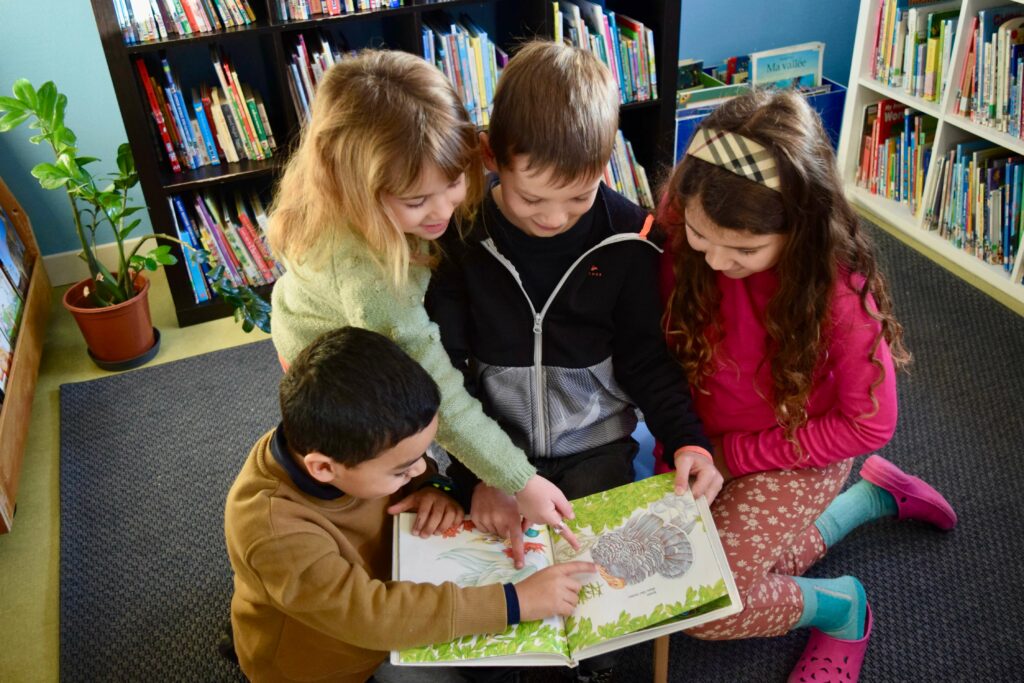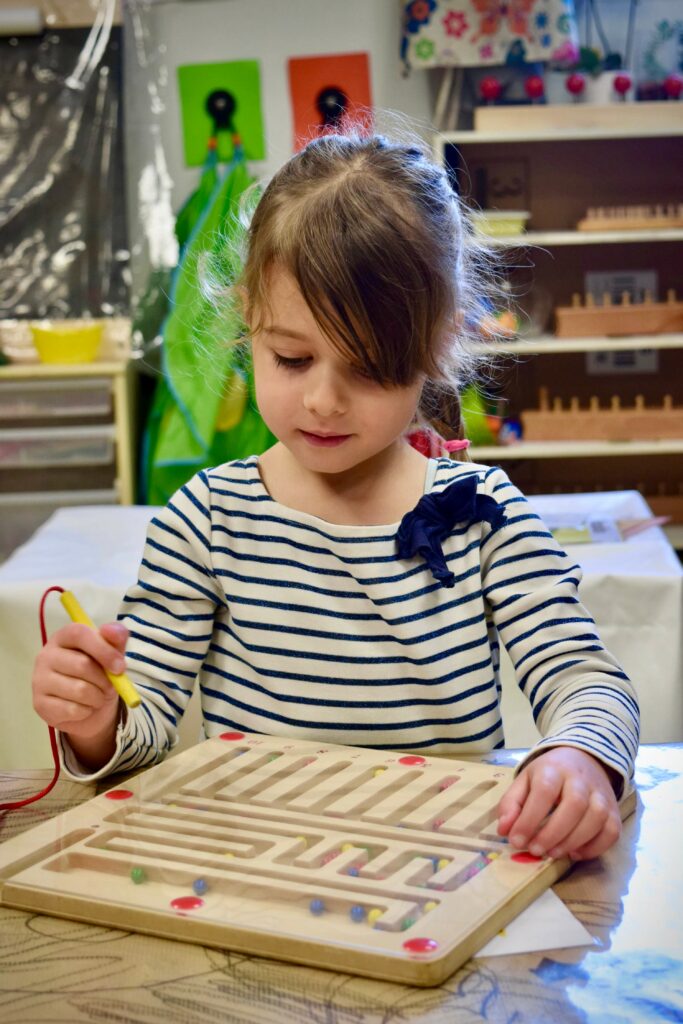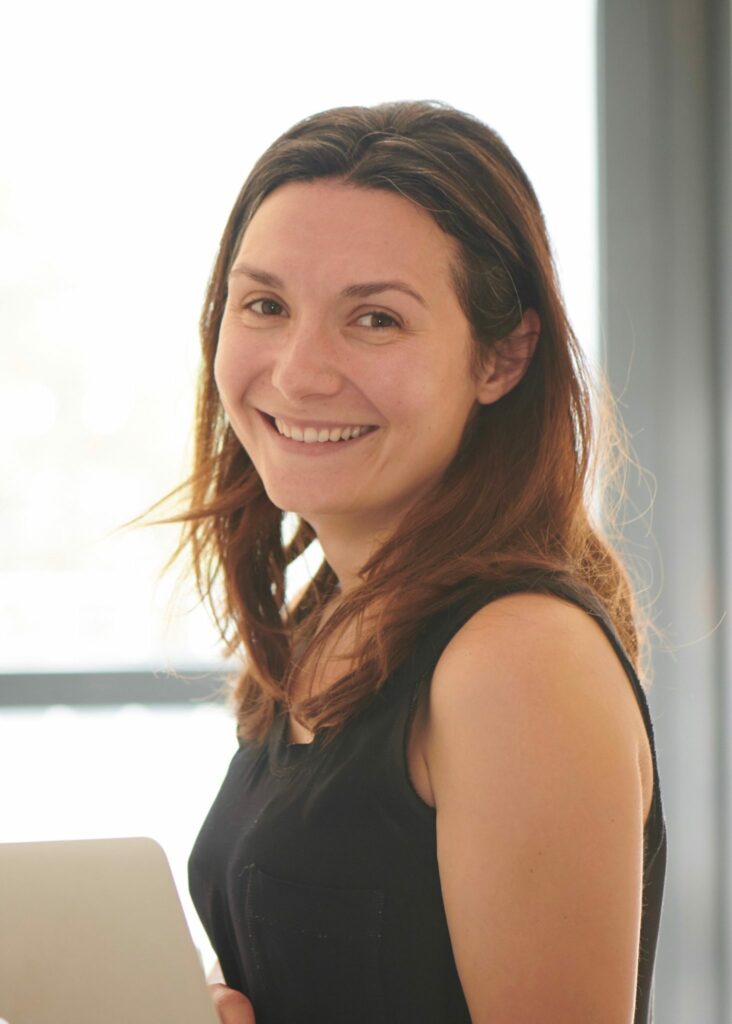Immersion
kindergarten
The kindergarten program, inspired by the best teaching methods, is rich and varied. In an environment conducive to learning, children develop their ability to live together, and build skills such as problem-solving and fine motor skills through play. Artistic and theatrical activities encourage creativity, imagination and self-confidence.
English is taught by native or bilingual teachers who pass on their culture, language and passion to help children discover, progress and develop their imagination and creativity.
Language immersion from an early age enables children to develop not only language skills, but also critical thinking and the ability to solve increasingly complex problems.
The advantages of our English immersion program in kindergarten
The best age to become bilingual
Three years of immersion to become bilingual, French-English! From the very first year of kindergarten, when children are still learning and consolidating their mother tongue, English immersion allows them to learn the language naturally, in a fun and motivating context.
From immersion to bilingualism
Learning French is not neglected, however: for each level, sequences in French, several times a week, enable children to develop and reinforce their skills, particularly in vocabulary and language structure. In Grande Section, French is taught for 1 hour a day, in preparation for CP, when the bilingual program is introduced.
Competent, passionate teachers
Our teachers’ native English guarantees a good immersion program. Our qualified teachers know how to establish a climate of listening and trust, enabling each student to blossom and progress in his or her learning.
Individual attention
Teachers give each child the opportunity to develop his or her full potential through a variety of activities, including motor skills, music, drawing, handicrafts and language arts. Nursery school children are accompanied in class by two adults: a teacher and a class assistant. Classroom assistants are a precious help, ensuring the children’s hygienic, material and safety well-being, as well as assisting with group work, complementing the teacher. Their presence promotes a calm classroom environment and enables personalized teaching for each child.
A reassuring and caring environment
Our Pré de Challes campus is a pleasant, well-designed environment for children. Safety and hygiene are our top priorities.
School catering
You have the option of registering your child for a meal service, served by a caterer (Leztroy Restauration) who guarantees fresh produce, cooked the same day and locally, with a high percentage of organic produce.
After-school and extra-curricular activities
Children can enjoy a wide range of activities if they come earlier in the morning or stay after school, with high-quality supervision and a wide choice of options. See the website page dedicated to this program (click here to link to the website page).
The Grande Section year, on the road to CP!
After the immersion program of the first years of kindergarten, Grande Section naturally evolves into a motivating bilingual program, preparing students for success in CP, where they will learn to read and write in both French and English. Grande Section de maternelle offers a program in French (4 hours per week) and English (20 hours per week).
Development of skills and enrichment of knowledge and vocabulary through :
Pre-reading and language skills.
Listening to stories
Problem-solving, comparison of quantities, manipulative activities through the study of situations and logic.
In this way, pupils can enter elementary school successfully.
While students benefit from a solid academic program, they also develop interpersonal and emotional skills. They give free rein to their imagination and develop a creative spirit through varied activities such as games, music, art, sports, field trips and participation in school events.


The main areas of the kindergarten program
Acting, expressing oneself, understanding through artistic activities
Our teachers offer a variety of activities throughout the year, adapted to students’ different learning styles, including drawing, artistic creation in two and three dimensions, vocal exploration, use of instruments, and various activities related to the performing arts.
• Explore instruments.
• Use body sounds.
• Practice some performing arts activities.
Building the first tools for structuring thought
Through their observations and interactions with the world and their toys, children already have an understanding of quantities. Teachers draw on each child’s knowledge and understanding to build new knowledge and skills
• Expressing quantities.
• Study numbers, their various decompositions and representations.
• Explore shapes, sizes and organized sequences.
Acting, expressing themselves, understanding through physical activities
Children in kindergarten learn a great deal through play and movement. They also develop qualities and knowledge through movement, in the following activities:
• Acting in space, over time and with objects.
• Adapting balance and movement to different environments and constraints.
• Communicating with others through expressive or artistic actions.
• Collaborate, cooperate and oppose.
Explore the world, with a wide range of activities designed to :
• Stabilize the first temporal reference points and introduce social reference points.
• FExperience space and discover different environments.
• Discover the living world.
• Use, make and handle objects.
We put into words the qualities to be encouraged: a taste for effort, benevolence, respect for others, listening, sharing… We reinforce each child’s natural qualities and work on those to be acquired. Children also learn to organize themselves and use their executive skills to complete a task.
A day in kindergarten
-
Group time
This enables children to develop their listening and vocabulary skills, and learn to communicate on subjects that interest them. They observe and comment on the weather, the days, the months, the date, etc. It's also a time for language, with nursery rhymes and stories, repetition and acquisition of new language structures, as well as free expression and “show and tell” by the children.
-
Discovery time
Guided by the teachers, pupils work in small collaborative groups on elements of the common skills base: graphics, location, mathematics, reading, fine motor skills, etc. They are thus engaged in their learning and benefit from the experiences gained in the workshops.
-
Motor skills time
Every day, pupils learn through movement, by appropriating spaces, jumping, crawling, running and adapting their movements to play situations.
-
Recess
These moments punctuate the day, morning, noon and night, enabling children to develop their imagination and revisit what they've learned in their own way. It's also a time to have fun and make friends.
-
Rest time
Respecting children's biological rhythms is crucial to effective learning. That's why, after lunch, the little ones take a nap and the older ones enjoy a quiet time reading or listening to music.
-
Free play time in class
Pupils choose their own games and, while having fun, develop their motivation, involvement and social skills.
-
Forest School' outings
In kindergarten, time is set aside for nature outings in the children's immediate environment. Depending on the level, outings can take place once a month, or by period. Children go out in all weathers, observing the changing seasons, learning to use their senses, and applying what they've learned in class.
Educational leadership

Emilie Tarraf-Lescoffier
Pedagogical Director, Pré de Challes school
(PS, MS, GS, CP)
Born to a Syrian father and an American mother, Emilie has integrated cultural diversity from an early age as a central element of her existence, an integral and formative part of her personality. The languages English, French and Arabic have been the carriers of the different cultures that have accompanied her from the cradle to adulthood. No doubt this particularity contributed to the open-mindedness that led her to teaching, while her atypical background in no way suggested that she was destined for a career in education.
CONTACT

